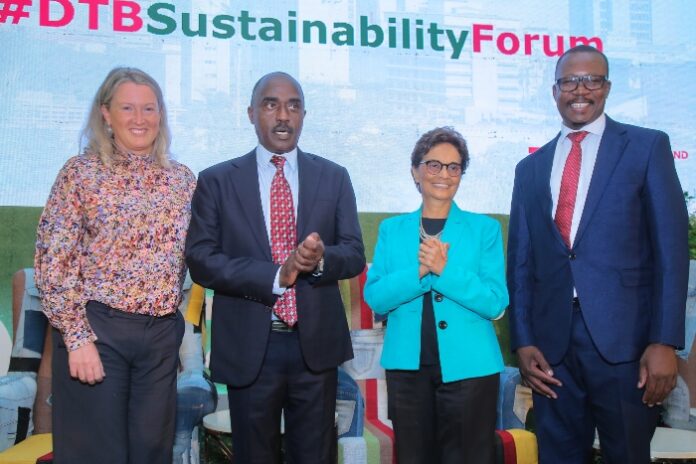Diamond Trust Bank (DTB) has today announced a commitment to grow its lending to green projects to a quarter of its loan book by 2030. The Bank has also committed to achieve net zero carbon emissions status across its group operations by the same time, which is in seven years.
DTB will also grow 10 million trees by 2030 through its #MuchMoreThanTrees initiative, as part of its efforts to help mitigate climate change.
Diamond Trust Bank opens Embu branch
The Bank announced the commitments during its inaugural economic and sustainability forum held at the Crowne Plaza in Nairobi and themed
“Embedding Sustainability in Businesses”.
The sustainability forum is informed by DTB’s efforts to meet its 2030 targets, guided by the Greenhouse Gas Protocol. Under the protocol, the bank is currently measuring its carbon emissions which are within DTB’s control.
The forum was geared towards sensitizing DTB’s customers, suppliers and partners on sustainable business practices that allow for carbon footprint measures and practices to enable DTB achieve a net zero status.
The move will see DTB source at least 50 per cent of its procurement needs from green vendors within its supply chain portfolio by 2030, as the bank also seeks to encourage its partners to measure and report their carbon status.
At the forum, DTB Group Chairman Linus Gitahi said:
“At DTB, we are cognizant that we have a role in the climate change battle, as a responsible corporate citizen. Stakeholder engagement and awareness is crucial for us as we crystallize our Environmental, Social and Governance (ESG) strategy.”
“The sustainability engagement forum is one of the primary efforts we have mapped out towards our carbon emissions measurements and accountability. We commit to walking the journey with our stakeholders to ensure we meet our net zero targets by 2030,” he added.
On her part, DTB CEO Nasim Devji reiterated DTB’s commitment, noting that the bank is in the process of revamping its existing environmental and social risk framework by developing a robust Environmental and Social Management System (ESMS) with an articulated policy, procedures, and processes on climate risk, which are also integrated into the Bank’s credit cycle.
“The ESG guidelines ensure business is conducted in an ethical manner and promotes the value of maintaining a balance between people, planet and profit to underwrite societal and business sustainability. We have embedded them in our business operations in order help combat climate change and the long-term prosperity of this country,” she added.
In line with its efforts to reduce its Scope 1 emissions, DTB has commenced the installation of solar panels at its headquarters in Nairobi, which will reduce the consumption of power from the national grid by an estimated 20%.
Rogue Moses Adagala attacked in AFC Leopard win against Wazito
The Bank has already grown over 1 million trees under the #MuchMoreThanTrees initiative, completed an energy management audit and adopted energy-efficient electrical and electronic appliances.
DTB’s efforts are part of the wider global Aga Khan Development Network (AKDN) Environment and Climate Change Committee, working under an international commitment, directives and strategies to ensure that all AKDN operations in 30 countries are carbon neutral by 2030.
The sustainability engagement forum was held to drive awareness and create ownership amongst DTB’s key constituents on the issues related to greenhouse gas emissions.
The forum drew discussions from sustainability experts on various opportunities, challenges and adaptability measures for local businesses.











